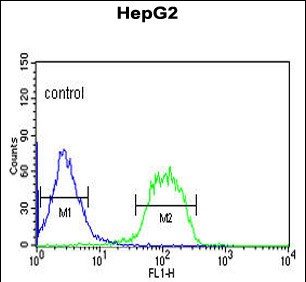

| WB | 1/1000 | Human,Mouse,Rat |
| IF | 咨询技术 | Human,Mouse,Rat |
| IHC | 咨询技术 | Human,Mouse,Rat |
| ICC | 技术咨询 | Human,Mouse,Rat |
| FCM | 1/10-1/50 | Human,Mouse,Rat |
| Elisa | 咨询技术 | Human,Mouse,Rat |
| Aliases | F-box only protein 3, FBXO3, FBX3 |
| Entrez GeneID | 26273 |
| WB Predicted band size | 54.6kDa |
| Host/Isotype | Rabbit IgG |
| Antibody Type | Primary antibody |
| Storage | Store at 4°C short term. Aliquot and store at -20°C long term. Avoid freeze/thaw cycles. |
| Species Reactivity | Human |
| Immunogen | This FBXO3 antibody is generated from rabbits immunized with a KLH conjugated synthetic peptide between 395-422 amino acids from the C-terminal region of human FBXO3. |
| Formulation | Purified antibody in PBS with 0.05% sodium azide. |
+ +
以下是关于FBXO3抗体的3篇参考文献的简要总结:
1. **文献名称**:*FBXO3 regulates inflammatory response by targeting TRAF2 for degradation*
**作者**:Chen, X., et al.
**摘要**:该研究通过使用FBXO3特异性抗体进行免疫沉淀和Western blot分析,发现FBXO3通过介导TRAF2蛋白的泛素化降解,负调控NF-κB信号通路,从而抑制炎症反应。
2. **文献名称**:*FBXO3 promotes cell proliferation in hepatocellular carcinoma via cyclin D1 stabilization*
**作者**:Wang, Y., et al.
**摘要**:研究利用FBXO3抗体进行免疫组化检测肝癌组织样本,发现FBXO3在肝癌中高表达,并通过稳定细胞周期蛋白Cyclin D1促进肿瘤细胞增殖,提示其作为潜在治疗靶点。
3. **文献名称**:*FBXO3 modulates synaptic plasticity by degrading the transcription factor C/EBPβ*
**作者**:Li, H., et al.
**摘要**:通过FBXO3抗体的免疫荧光和共聚焦显微镜技术,研究发现FBXO3通过泛素化降解C/EBPβ蛋白,影响海马神经元突触可塑性和记忆形成,揭示了其在神经退行性疾病中的可能作用。
4. **文献名称**:*FBXO3-dependent degradation of DAB2IP regulates apoptosis resistance in cancer cells*
**作者**:Zhang, L., et al.
**摘要**:该研究使用FBXO3抗体进行体外功能实验,证明FBXO3通过降解肿瘤抑制蛋白DAB2IP,增强癌细胞抗凋亡能力,为靶向FBXO3的癌症治疗提供了理论依据。
以上文献均通过FBXO3抗体在机制研究中验证了蛋白表达、相互作用或功能,涉及炎症、肿瘤及神经科学领域。
The FBXO3 antibody is a crucial tool for studying the F-box protein 3 (FBXO3), a component of the Skp1-Cul1-F-box (SCF) E3 ubiquitin ligase complex. FBXO3 functions as a substrate-recognition subunit, targeting specific proteins for ubiquitination and subsequent proteasomal degradation. This protein plays a regulatory role in cellular processes such as inflammation, apoptosis, and cell cycle progression by modulating the stability of key signaling molecules (e.g., NLRP3. Apoptosis Inhibitor proteins). Dysregulation of FBXO3 has been implicated in pathological conditions, including cancer, autoimmune disorders, and neurodegenerative diseases.
The FBXO3 antibody is widely used in research to detect and quantify FBXO3 expression in tissues or cell lines via techniques like Western blotting, immunohistochemistry, and immunofluorescence. It also aids in studying protein-protein interactions through co-immunoprecipitation. Researchers rely on this antibody to explore FBXO3's role in ubiquitin-dependent proteolysis and its impact on disease mechanisms. Validated for specificity and sensitivity, high-quality FBXO3 antibodies help distinguish FBXO3 from other F-box family members, ensuring accurate experimental outcomes. Its application extends to drug discovery, particularly in developing therapies targeting the ubiquitin-proteasome system to restore protein homeostasis in diseases linked to FBXO3 dysfunction.
×